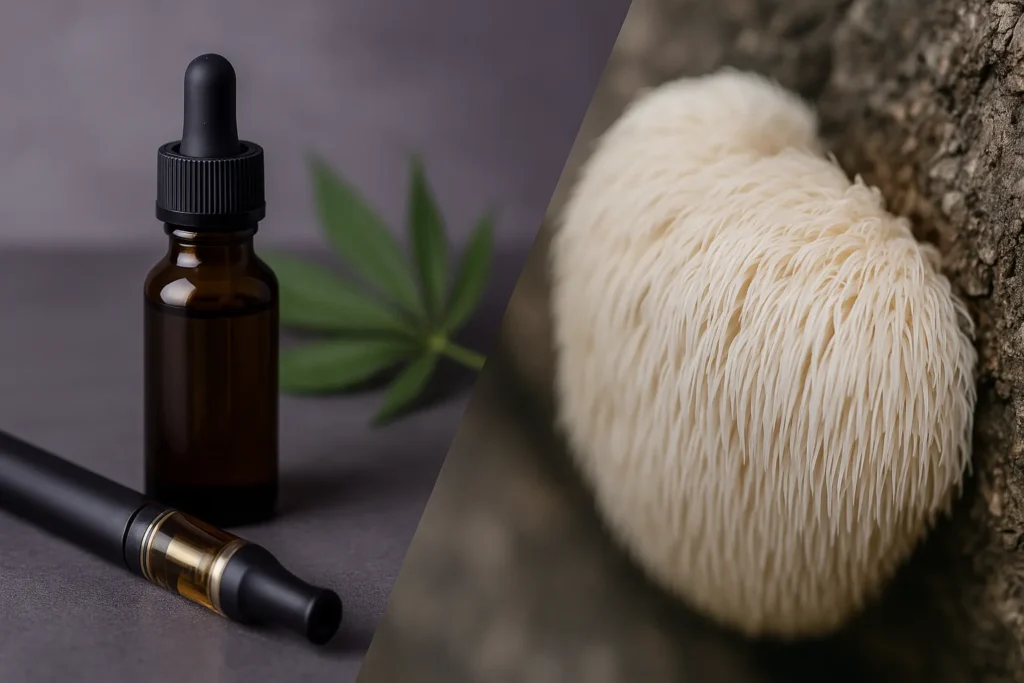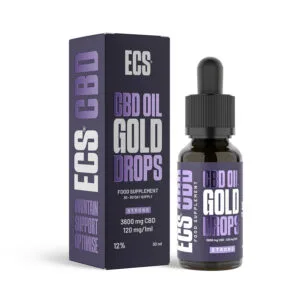
In recent years, the wellness world has seen a growing interest in natural remedies, with CBD and functional mushrooms gaining significant attention.
Both are lauded for their potential health benefits, yet they come from entirely different sources and offer distinct properties.
CBD, short for cannabidiol, is a compound found in cannabis plants, often highlighted for its calming effects.
Meanwhile, functional mushrooms like reishi, lion’s mane, and chaga have been part of traditional practices for centuries, known for supporting immunity and cognitive function.
This post aims to shed light on the differences between CBD and functional mushrooms, helping you make informed choices about incorporating them into your lifestyle.
CBD has garnered attention for its therapeutic properties.
This section explores CBD’s origins, common uses, and potential health benefits, providing a foundational understanding of this popular compound.
CBD, or cannabidiol, is primarily extracted from the cannabis plant.
Cannabis sativa and Cannabis indica are the two major species.
While both contain CBD, they differ in THC levels. Industrial hemp, a type of Cannabis sativa, is predominantly used for CBD extraction due to its low THC content.
The extraction process is pivotal in obtaining pure CBD.
Common methods include CO2 extraction, solvent extraction, and oil infusion. CO2 extraction is the most favoured due to its efficiency and ability to produce a clean product.
Solvent extraction uses ethanol or other solvents but may leave residues. Oil infusion, although simple, is less efficient.
Understanding the origin and extraction methods is crucial for consumers interested in the purity and potency of CBD products. Each method impacts the quality, safety, and efficacy of the final product.
CBD is versatile in its applications. Chronic pain management is one of the most popular uses of CBD, with many people opting for CBD oils or CBD e-liquids for convenience.
Anxiety and stress relief are also common reasons for CBD consumption. Users often report a calming effect, making it a potential aid for stress-related issues.
Furthermore, CBD’s potential to improve sleep quality is increasingly acknowledged, see our guide to CBD for sleep for practical tips.
In the beauty space, CBD also features in topical products such as CBD balms, where antioxidant and soothing properties support skin comfort.
This broad range of uses highlights CBD’s adaptability in addressing various health and wellness needs.
CBD’s health benefits stem from its interaction with the body’s endocannabinoid system (ECS), this system plays a role in regulating mood, pain, and immune response.
Research suggests CBD’s potential in reducing seizure frequency in certain epilepsies, and it is being investigated for wider neurological support.
For balanced, up-to-date medical context in the UK, the NHS has a helpful overview of medical cannabis and CBD.
Beyond neurological benefits, CBD shows promise in alleviating symptoms of chronic issues such as joint discomfort.
Although more research is needed, current studies suggest CBD’s potential as a natural therapeutic agent—offering benefits without the psychoactive effects of THC.
Functional mushrooms have been used for centuries in various cultures. This section delves into different types of functional mushrooms, their history, and the nutrients they offer.
Functional mushrooms are celebrated for their health-promoting properties. Reishi, lion’s mane, and chaga are some of the most notable types.
Reishi mushrooms are often called the “mushroom of immortality” due to their traditional association with immune balance.
Lion’s mane is recognised for its cognitive benefits, with interest around memory and focus.
Chaga grows on birch trees and is noted for antioxidant content. Each type offers unique benefits, making them popular in natural health routines.
For centuries, functional mushrooms have played a significant role in traditional medicine.
In Chinese traditions, reishi is revered for vitality and balance.
Lion’s mane features in Japanese and Chinese practices for supporting clarity and focus.
Chaga has roots in Siberian and Scandinavian cultures, often brewed as a tea to support wellness.
These traditional uses highlight the enduring significance of functional mushrooms in cultural healing practices.
Functional mushrooms are nutrient-dense. They are rich in beta-glucans (linked with immune support) and various antioxidants.
Reishi is widely discussed as an adaptogen for stress balance, lion’s mane is associated with brain health, and chaga contains B vitamins, minerals, and fibre.
The diverse nutrients in functional mushrooms contribute to their reputation as potent natural remedies, enhancing both physical and mental wellbeing.
CBD and functional mushrooms offer distinct benefits but differ in composition and effects.
This section compares these two natural substances, examining their differences, effects, and safety.
| Aspect | CBD | Functional Mushrooms |
|---|---|---|
| Source | Cannabis plant | Various mushroom species |
| Active Compounds | Cannabinoids (e.g., CBD) | Beta-glucans, polysaccharides |
| Psychoactive Effects | No (legal CBD products contain negligible THC) | No |
| Common Forms | Oils, capsules, e-liquids | Powders, extracts, teas |
CBD is extracted from the cannabis plant and contains cannabinoids (notably cannabidiol with minimal THC in legal UK products).
Functional mushrooms are derived from various species, each rich in beta-glucans and other polysaccharides.
These differences influence their applications and effects. CBD is commonly available in oils, e-liquids, and capsules, while functional mushrooms are often found in powders, extracts, and teas.
CBD primarily interacts with the body’s endocannabinoid system (ECS), influencing mood, pain, and stress response.
This interaction is why CBD is often used for calm and comfort, with options ranging from ECS Gold 6% CBD Drops to higher strengths like ECS Gold 12% CBD Drops and ECS Gold 3% CBD Drops.
Functional mushrooms, on the other hand, work through different biological pathways—supporting immune function and cognitive health via beta-glucans and other bioactives.
Both offer unique benefits, yet their effects vary based on distinct mechanisms of action. Understanding these can help you choose the right option for specific goals.
Safety is paramount when considering supplements. CBD is generally well-tolerated, but some may experience dry mouth, fatigue, or changes in appetite.
For impartial UK guidance, see the NHS information on medical cannabis and CBD.
Functional mushrooms are also considered safe for most people, though large amounts may cause digestive discomfort in some.
Introduce either slowly, monitor how your body responds, and consult a healthcare professional if you’re taking medication or have existing conditions.
Selecting the right supplement involves considering various factors.
This section provides guidance on choosing between CBD and functional mushrooms, popular products in the UK, and combining both for enhanced benefits.
When choosing between CBD and functional mushrooms, consider your goals, product quality, and fit for your lifestyle. Starting with low doses and tracking your response is a smart approach.
The UK market offers a variety of CBD and mushroom products.
CBD oils and gummies are popular—if you prefer vaping, explore CBD e-liquids and our best CBD vape pens. If you want minimal ingredients, CBD concentrates are a clean, potent option.
Functional mushrooms are commonly found in powders and capsules from specialist wellness brands. Choose products with transparent beta-glucan content and reputable sourcing.
Combining CBD and functional mushrooms may offer complementary benefits. While research is ongoing, many people pair a balanced CBD oil such as ECS Gold 12% CBD Drops in the evening with morning lion’s mane to support focus.
For those interested in a comprehensive approach, combining these supplements can offer a rounded wellness routine—track how you feel and adjust as needed.

In the final section, we summarise the key points discussed, helping readers make an informed decision about CBD and functional mushrooms.
CBD and functional mushrooms are distinct yet valuable natural options.
CBD’s calming and comfort-focused profile contrasts with the immune and cognitive support often associated with functional mushrooms. Understanding their differences and benefits can guide smarter choices.
Choosing between CBD and functional mushrooms depends on personal health goals and preferences. Consider safety, quality, and desired outcomes.
Consult professionals where needed and choose high-quality products with clear lab testing. By weighing benefits and potential risks, you can confidently decide how best to incorporate CBD and functional mushrooms into your routine.